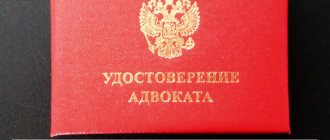Kidnapping (Article 126)
Kidnapping (Article 126 of the Criminal Code of the Russian Federation).
Object of the crime:
- generic – social relations in the field of personal protection;
- specific - social relations in the sphere of protecting freedom, honor and dignity of the individual;
- direct - social relations that develop regarding the realization by a person of the natural right to freedom of residence and movement and ensuring the security of freedom as the most important social good;
- direct additional - social relations ensuring the safety of life and health of the victim (in qualified crimes - parts 2, 3 of Article 126 of the Criminal Code of the Russian Federation).
Victim – any living individual.
The objective side of the crime consists of active actions to kidnap a person.
Kidnapping should be understood as unlawful intentional actions associated with the secret or open possession (capture) of a living person, removal from his place of permanent or temporary residence, followed by detention against his will in another place.
The corpus delicti is formal; the crime is completed from the moment all actions aimed at the abduction are completed.
Excludes criminal liability:
- the consent of the victim to his “kidnapping” (kidnapping at the request of the victim);
- compliance with conditions of extreme necessity (for example, when relatives “kidnap” a child from parents whose behavior poses a threat to his life, health, and proper personality formation).
The kidnapping involves three sequential operations:
- capture (taking possession);
- moving;
- holding a person.
Capture means secret or open, active actions related to the establishment of physical dominance over a person (taking possession of him), as a result of which the victim is actually deprived of freedom of movement in space; displacement is the transportation (both with and without the use of vehicles) of the victim to a new place of residence, not typical for his usual life routine, against or against his will; restraining is preventing the victim (for example, by locking, tying, using force, placing physical barriers, etc.) from freely leaving this new place.
Due to the characteristics of the objective side, if it is established that the perpetrator, when depriving the victim of his freedom, did not intend to move him in space and hold him, the act cannot be qualified under Art. 126 of the Criminal Code of the Russian Federation, but if there are grounds for this, it can be qualified as unlawful deprivation of liberty (Article 127 of the Criminal Code of the Russian Federation). At the same time, according to Art. 126 of the Criminal Code of the Russian Federation qualifies actions not only in the case when a person is kidnapped and moved to another place, but also when he is illegally detained, and therefore the detention itself does not require additional qualification under Art. 127 of the Criminal Code of the Russian Federation as unlawful deprivation of liberty. If the person’s actions were not aimed at keeping the victim in another place, but were an element of the objective side of another, more dangerous crime (for example, murder), there is no element of kidnapping. Only if the intent to commit another crime in relation to the kidnapped person arose after the end of the kidnapping itself, the act can form a set of crimes.
Kidnapping, qualified under Part 1 of Art. 126 of the Criminal Code of the Russian Federation, may be accompanied by the use of violence against the victim or other persons that is not dangerous to life or health (which should be understood as beatings or other violent acts associated with causing physical pain to the victim), or the threat of using such violence. Violence in this case does not require additional qualification based on the totality of crimes.
The elements of the crime are formal; the crime is considered completed from the moment the person is moved to another place for further detention. The capture of the victim without moving him constitutes an attempt to commit this crime.
Subject is a sane individual who has reached the age of 14 years.
The subjective side is characterized by direct intent.
In Part 2 of Art. 126 of the Criminal Code of the Russian Federation provides for qualifying signs of kidnapping
- by a group of persons by prior conspiracy;
- with the use of violence dangerous to life or health, or with the threat of such violence;
- using weapons or objects used as weapons;
- in relation to a known minor;
- in relation to a woman who is known to the perpetrator to be pregnant;
- in relation to two or more persons;
- for selfish reasons.
Particularly qualifying features are (Part 3 of Article 126 of the Criminal Code of the Russian Federation):
- committed by an organized group (Article 35 of the Criminal Code of the Russian Federation);
- caused by negligence the death of the victim or other grave consequences.
Due to the direct indication of the law in relation to death, guilt is characterized by negligence.
Other serious consequences include suicide of the victim, mental disorder, including his relatives, major material damage, the occurrence of ethnic clashes, riots, etc.
In the note to Art. 126 of the Criminal Code of the Russian Federation establishes a special type of exemption from criminal liability. A person who voluntarily frees a kidnapped person is exempt from criminal liability unless his actions contain another crime. Voluntary release is recognized as release that was not associated with the inability to hold the abducted person or the fulfillment or promise to fulfill the conditions that were the purpose of the abduction.
0
1.5



